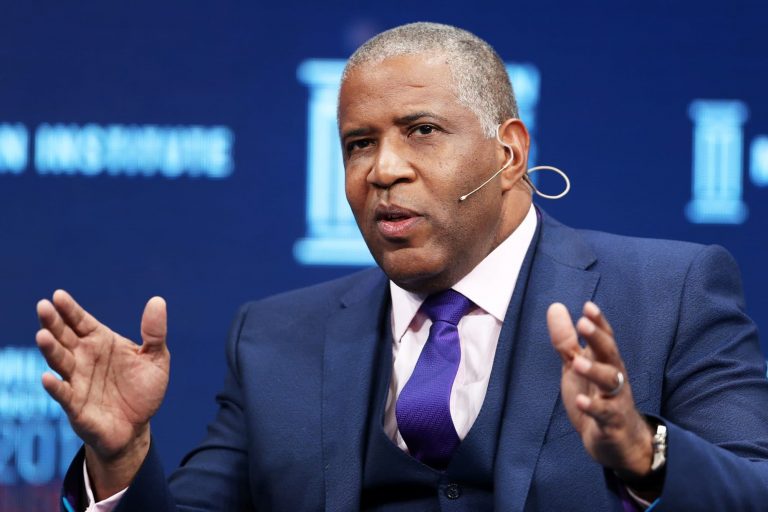
Robert F. Smith, CEO of Vista Equity Partners, has issued a warning about the fate of finance jobs in the age of artificial intelligence, predicting that a majority of professionals in the sector may soon be out of work as AI tools take over critical functions.
Speaking Thursday at the SuperReturn International private capital conference in Berlin, Smith told a crowd of more than 5,500 private equity leaders that the job market is on the brink of a sweeping transformation—and the disruption is coming faster than most expect.
“We think that next year, 40% of the people at this conference will have an AI agent, and the remaining 60% will be looking for work,” Smith said, referencing autonomous software programs capable of executing complex, multi-step financial tasks.
Register for Tekedia Mini-MBA edition 19 (Feb 9 – May 2, 2026): big discounts for early bird.
Tekedia AI in Business Masterclass opens registrations.
Join Tekedia Capital Syndicate and co-invest in great global startups.
Register for Tekedia AI Lab: From Technical Design to Deployment (next edition begins Jan 24 2026).
The conference, regarded as the world’s largest private equity gathering, included senior executives from global investment giants like Goldman Sachs, BlackRock, and KKR. Smith’s remarks hit close to home for many in the audience, particularly as AI deployment across banking and finance accelerates.
A Shared Warning from the Top
Smith is far from alone in sounding the alarm. JPMorgan Chase CEO Jamie Dimon said in October 2023 that AI could one day lead to a 3.5-day workweek as it replaces jobs and boosts productivity. While he acknowledged its benefits, he emphasized the societal challenges posed by mass displacement. Similarly, IBM CEO Arvind Krishna stated in May 2023 that the company was pausing hiring for roles that AI could replace, estimating that nearly 30% of back-office jobs, such as HR and administrative positions, could be automated within five years.
These high-level concerns are no longer theoretical. Layoffs attributed to AI and automation are already underway in some of the world’s most powerful financial institutions and tech-adjacent firms.
Earlier this year, JPMorgan Chase eliminated hundreds of jobs across its tech and operations divisions, part of a broader effort to streamline functions that AI can now handle. While the bank did not explicitly state AI as the reason, it has significantly ramped up its investment in AI tools—including building its own ChatGPT-like platform, “IndexGPT,” to serve clients.
Goldman Sachs laid off over 3,000 employees in early 2023, citing a shift in business priorities. Analysts say the move also aligned with the firm’s internal automation efforts to reduce redundancy in middle-office operations, especially in areas like compliance and risk modeling.
In the tech world, Google’s parent company, Alphabet, confirmed in January 2024 that it had let go of employees in its advertising sales unit as part of a restructuring effort heavily influenced by automation and AI-driven ad tools. Meta (Facebook’s parent company) also cited automation when it cut tens of thousands of jobs during its “year of efficiency.”
These moves echo Smith’s core argument: AI is not just changing jobs—it is eliminating them.
“All of the jobs that the one billion knowledge workers do today will change,” Smith told the Berlin audience. “I’m not saying they will all go away, but they will all change. You will have hyperproductive people in organizations, and you will have people who will need to find other things to do.”
Finance Faces the Frontline
The financial industry is uniquely exposed to this disruption. A June 2024 report from Citigroup found that 54% of jobs in finance—particularly those in accounting, trading, and portfolio management—have a “high potential for automation.” Another 12% could be significantly “augmented” by AI, with humans working alongside machines.
Citi’s report also projected that global banking profits could jump from $1.7 trillion to nearly $2 trillion by 2028, largely because of productivity gains from AI. However, that boost in profits will likely come at the cost of headcount.
In a survey released in January by Bloomberg Intelligence, Wall Street firms said they expect as many as 200,000 job cuts in the next five years due to AI—targeting roles in research, compliance, risk, and even dealmaking.
Preparing for the Inevitable
Smith, whose firm Vista Equity Partners manages more than $100 billion in assets and specializes in software and tech companies, has a front-row view of this shift. His message to industry professionals is that AI adoption will create a smaller, more efficient workforce and those who fail to adapt may find themselves outpaced and unemployed.
The implications reach far beyond finance. Smith’s call to action, alongside similar warnings from other business titans, suggests a future in which AI not only changes how work gets done but who gets to do it.
The question now is how institutions, regulators, and workers themselves will respond as AI redefines the structure of global employment—and whether those left behind will have a place in the next chapter of the economy.



